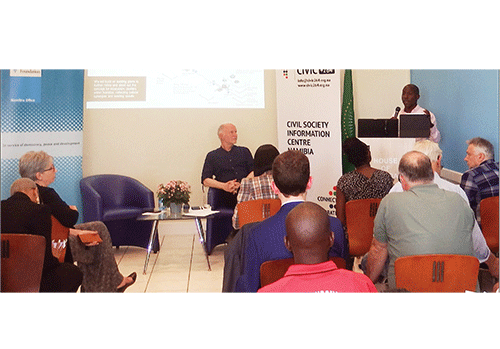While significant progress has been made in green hydrogen production in Namibia, including the US$10 billion Hyphen Hydrogen Energy’s agreement with the government, scholars and members of civil societies have voiced concerns over the “green hydrogen frenzy”.
The ambitious project promises to unlock Namibia’s potential of becoming one of the world’s leading green hydrogen production hubs by leveraging the country’s world-leading wind and solar resources, vast open spaces, and stable investment climate, underpinned by strong democratic values.
However, civil societies are yet to be convinced of its potential. They have since raised concerns about the project only benefiting a selected few at the expense of the local people.
The Economic and Social Justice Trust’s concerns amongst others, are socio-ecological concerns due to the use of the Tsau-||Khaeb National Park for the Hyphen project, desalination plants, and the destruction of endemic eco-systems.
“Green hydrogen is forced down our throats,” expressed, Rinaani Musutua, a trustee of the Economic and Social Justice Trust.
According to Musutua, a lot of people are left out of the process.
“We do not know if the project is financially viable, we don’t know what the risks are, we are not fully aware of the benefits, things are not explained properly to the Namibian people, everything is forced down our throats,” she said.
She also feels “there is lack of transparency and so much secrecy”.
“What is out there are random questions, we do not know if the project is feasible as no feasible study was done,” said Musutua.
The society is seeking answers from the government, saying at the moment, the information it has provided is sketchy.
Last week, scholars from the Hamburg University of Technology in collaboration with the Economic and Social Justice Trust, Civic264+, and Germanwatch held a workshop in Windhoek to unite actors working in different sectors that are affected by the new Green Hydrogen economic sector.
Held under the theme ‘Uniting to share experiences and strategise’, the team strongly believes that green hydrogen initiatives are being rushed, neglecting the essential step of consulting with community members, and they seek to address this concern.
“Land conflicts that arise due to infrastructure and plant constructions; water conflicts due to freshwater extraction for hydrogen plants; political concerns due to non-transparent tender processes and lacking consideration of civil society perspectives; as well as financial burdens that may arise through financial dependencies and further indebtedness,” said the group.
The group expressed that its export-oriented strategy, the hydrogen economy could take on extractive dynamics, fearing that history might repeat itself “as it happened in the past with fossil energy sources, diamond mining, and other precious raw materials”.
More concerns
Meanwhile, chairperson for Eartlife Namibia, a non-governmental organisation, Bertchen Kohls said that as much as she supports green hydrogen in its entirety, the manner in which the project is being conveyed leaves them with more questions than answers.
“Now it is up to us as civil society and community members to approach the government to come up with answers. We have many questions because as the civil society, we were never consulted,” said Kohls.
Concurring with her words is Andreas Indongo, a youth social development facilitator who feels that young people are left out.
“The scholarship opportunities have bluntly excluded the prime youth, and grades 10, 11, and 12 are not catered for in these scholarships. These are the youth coming out of school wanting to be integrated into the system. Secondly, the less-skilled youth are not included, there is no mature level entry and these are the biggest causes of youth unemployment,” he said.
Tobias Kalt, a scholar from the Hamburg University, said the research was conducted with the intention of fostering social change.
“As part of our research, we have observed that there are numerous promises being made by both the German government and the European Union to Namibia,” said Kalt.
He said international partners’ primary focus is on securing a supply of green hydrogen to Europe at low rates, obtaining critical minerals, and facilitating investments by German technology companies in Namibia.
“We have found a significant lack of consideration for the well-being of the Namibian people. Our research finds that it is very much some extractives economy that is being set up to get to these resources without contributing much to the development of the local economy,” said Kalt.
Govt weighs in
The government, through the green hydrogen commissioner, James Mnyupe remains resolute in its support for the implementation of the project.
In an interview with New Era, Mnyupe said since the launch of Harambee Prosperity Plan II (HPII) it has undertaken various initiatives to showcase its ambitions to incubate a new synthetic fuels industry and champion a green hydrogen programme, which he said aspires to promote a green industrialisation agenda.
“These efforts have the potential to create more than 280 000 jobs by 2030, bolster the GDP by more than US$4.1 billion, entrench the energy security and diversify exports, leaving Namibia less vulnerable to external shocks,” said Mnyupe.
Namibia is currently hosting at least five prospective green hydrogen projects in both the //Kharas and the Erongo regions.
“Those projects are responsible for mapping and engaging key stakeholders,” said Mnyupe.
The commissioner noted that each of these projects is engaging its own portfolio of stakeholders as prescribed by the existing legislative landscape to get broader community buy-in and de-risk the projects.
“Some projects have gone beyond engaging stakeholders such as local communities and have partnered with some communities and indeed have even started employing people from said communities,” he said.
-ashikololo@nepc.com.na



